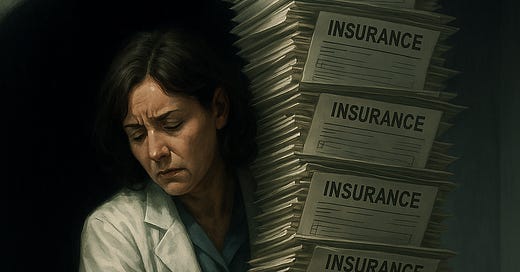Paid Subscriber Content.
I’ve been seeing the same doctor for nearly two decades. Even after his practice stopped accepting my insurance, I kept going. I pay out of pocket now, gladly. That’s how much I respect him—his intelligence, his kindness, and his consistency. He’s been there through nagging coughs, middle-of-the-night anxiety attacks, and the annual rituals of staying upright in middle age.
He’s the kind of doctor who looks you in the eye when you talk. Who remembers your daughter’s name. Who doesn’t treat your questions like an interruption. In short, he’s one of the good ones.
So when he walked into the exam room a few days ago and snapped at me, it caught me completely off guard.
“I didn’t realize you were coming in here with all these problems,” he said. “I don’t really have time to talk about everything. I’ve got a lot of people waiting.”
The words landed hard. I froze. Not because I was offended—though I was momentarily bruised—but because I could tell immediately: this wasn’t really about me.
The waiting room was quiet. No frantic crowds spilling into the hallway. But the pressure in the air? Palpable. You could see it in the lines on his face, the hitch in his voice.
He wasn’t being cruel. He was being crushed.
To his credit, he quickly recognized his tone and softened. The rest of the visit was more like what I’ve always known—measured, thoughtful, human. I left with what I needed, and without holding a grudge. But the encounter stuck with me. Because I realized: my doctor isn’t failing me. He’s failing under a system that’s failing all of us.
The American healthcare system is not merely flawed. It's structurally, philosophically, and often deliberately broken.
We spend more on healthcare than any other country—more than $4.5 trillion a year. That’s nearly one-fifth of our GDP. And yet, our health outcomes are worse than most other wealthy nations: lower life expectancy, higher rates of maternal and infant mortality, and soaring chronic disease rates. For all our spending, what we’re buying is stress—for patients and for providers.
Unlike other developed nations, we’ve treated healthcare as a commodity rather than a basic right. It’s a marketplace dominated by private insurance giants, each operating with the mission not of wellness, but of profit.
Doctors like mine—who went into medicine to help people—are now asked to practice medicine while navigating a thicket of bureaucratic nonsense: prior authorizations, claim denials, endless coding, and performance metrics designed more for billing than for healing. The American Medical Association reports that physicians now spend nearly two hours on administrative work for every hour of patient care. Think about that. Two hours.
And the insurers? They’re not just annoying middlemen. In many cases, they act as de facto gatekeepers to treatment. In 2023, UnitedHealthcare faced lawsuits for using AI-driven systems to auto-deny patient claims—sometimes in real time, even mid-procedure. There are credible reports of claims reps without medical licenses calling doctors during surgery to second-guess treatment plans.
That’s not medicine. That’s corporate overreach in scrubs.
My doctor, like so many others, is left carrying the impossible load. He is part caregiver, part data clerk, part defense attorney against an insurance bureaucracy designed to say no. And now, in his early 60s, he’s clearly running on fumes.
Burnout isn’t just a buzzword. It’s an epidemic. Nearly half of U.S. doctors report feeling burned out, citing lack of autonomy, crushing paperwork, and moral injury—yes, that’s the term—caused by being unable to give patients the care they know they deserve.
I saw that moral injury in my doctor’s eyes when he snapped at me. I think, in that moment, he hated that the system had turned him into someone who would say something like that to a longtime patient. That’s the cruel twist: the system doesn’t just burn out doctors. It makes them complicit in its dysfunction.
And patients like me? We're the collateral damage. We wait, we worry, we pay—and then we pay again.
So if your doctor snaps at you one day, maybe don’t snap back. Take a breath. Look closer.
You might just be seeing the human cost of a system that’s lost its soul.
When my doctor snapped, he reminded me—not of his failure—but of the quiet, slow-moving collapse of a system that demands more and gives less.
And maybe, just maybe, we’re all long overdue for a second opinion.
Sources & Suggested Reading:




